How to manage stress during the recovery process

Introduction
Recovering from addiction is a challenging journey where managing stress becomes crucial in maintaining sobriety and enhancing mental well-being. Stress can impede recovery by triggering cravings and increasing the likelihood of relapse. This article explores various strategies to manage stress effectively during the recovery process, ensuring a healthier path towards long-term sobriety.
Understanding the Impact of Stress on Recovery
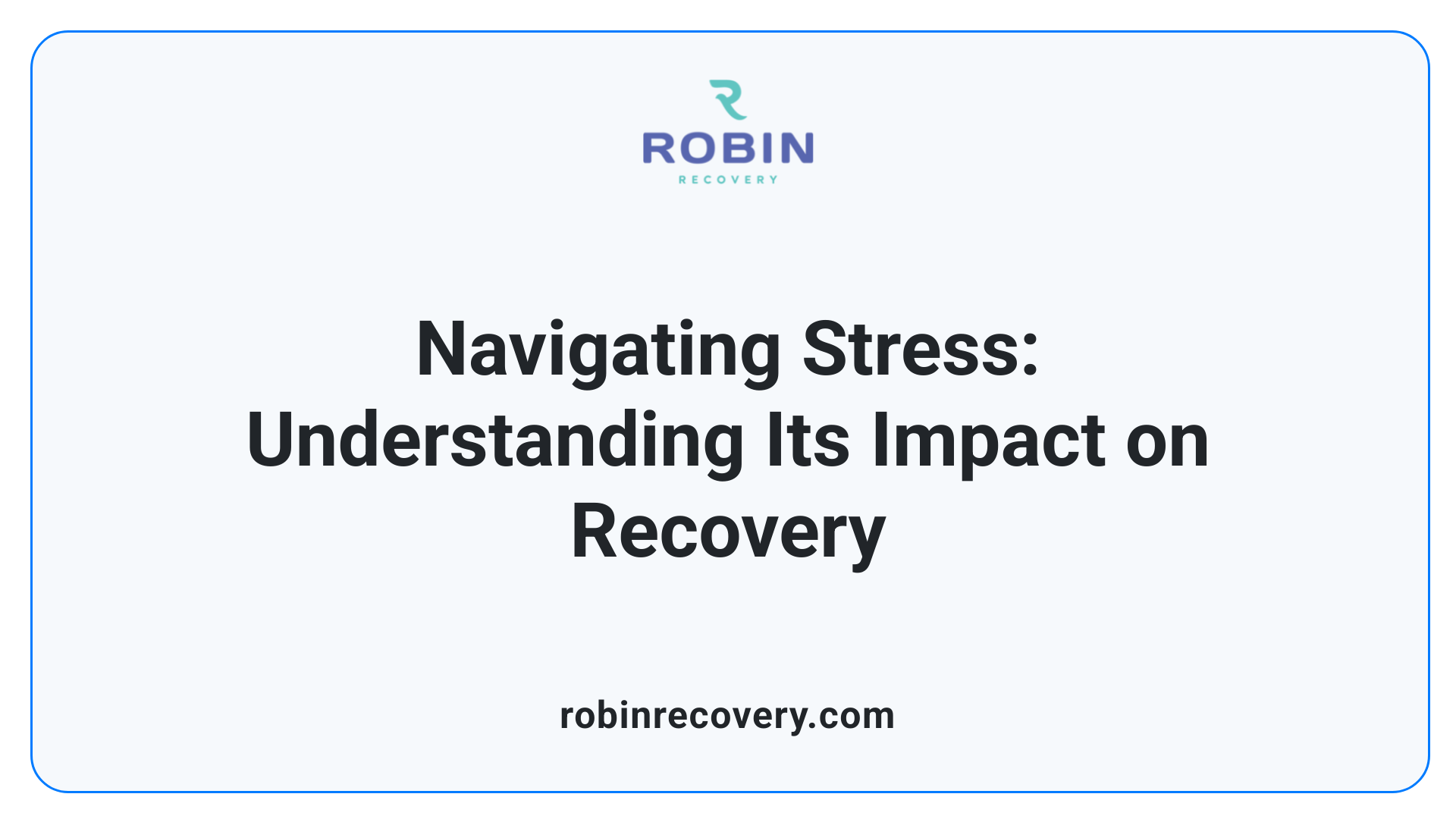
What is stress and how can it affect recovery?
Stress is the body's natural response to perceived challenges or demands. It manifests in physiological changes, including increased heart rate, elevated blood pressure, and heightened cortisol levels. For individuals recovering from addiction, stress can present significant hurdles. It often triggers cravings, making the journey towards sobriety more challenging while increasing the risk of relapse.
Common triggers caused by stress
During recovery, common stressors include:
- Financial difficulties: Struggling with costs related to healthcare or everyday living can be overwhelming.
- Caregiving responsibilities: Balancing personal recovery with the care of others can lead to burnout.
- Uncertainty about the future: Many face anxiety regarding employment, relationships, or health outcomes, which can overshadow recovery efforts.
Physiological changes due to stress
Chronic stress is not only mentally taxing but also detrimental to overall well-being. It impacts cognitive function and emotional resilience, leading to:
- Impaired decision-making abilities, making it difficult to make recovery-supporting choices.
- Heightened vulnerability to anxiety and depression, further complicating the recovery process. Regular exposure to stress can trigger increased cravings for substances as a way to cope, emphasizing the need for effective stress management strategies. To mitigate these effects, engaging in techniques like mindfulness meditation, regular exercise, and building strong support networks are essential steps during recovery.
Stress Management Techniques to Avoid Substance Use
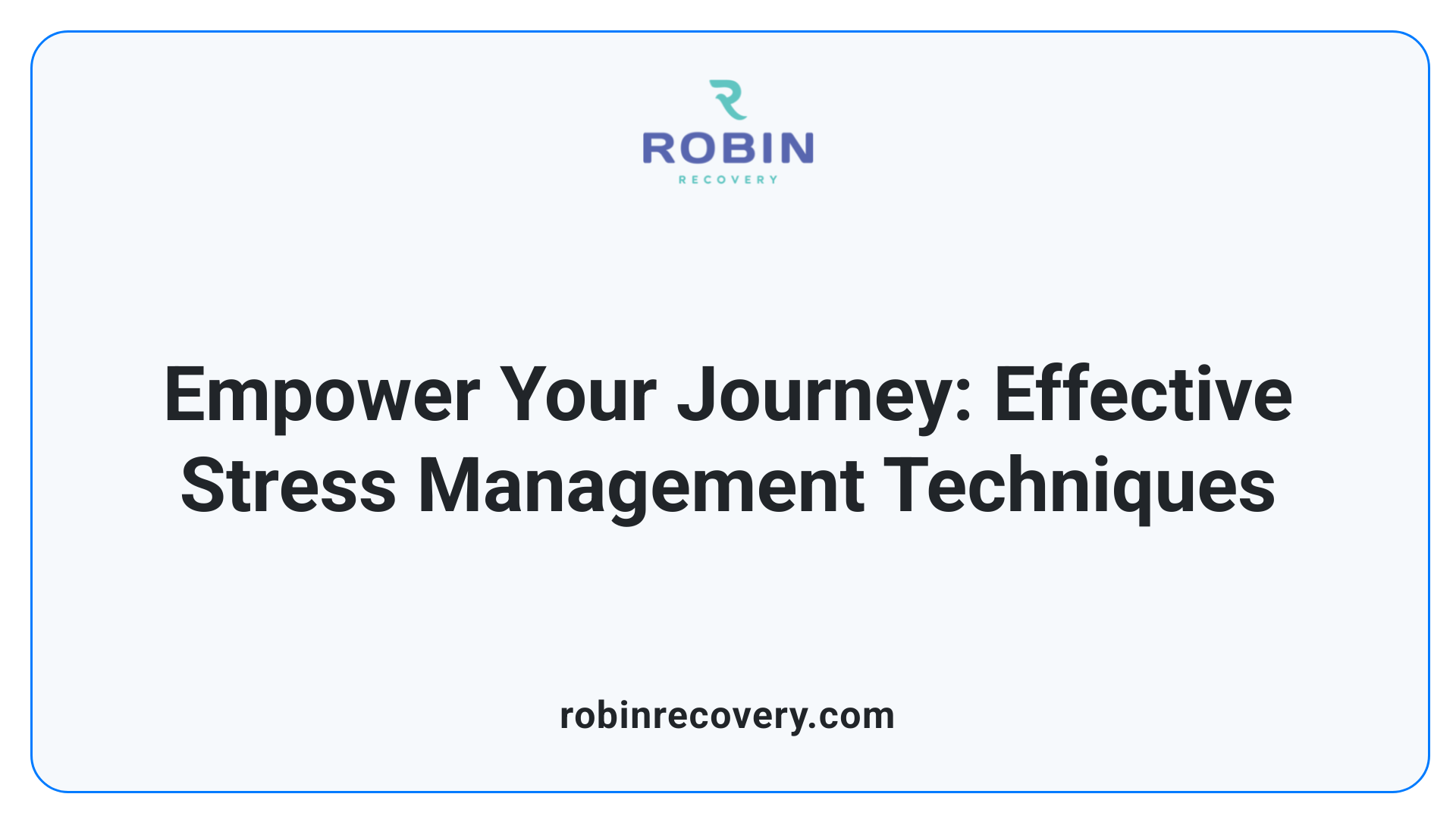
How can one manage stress without resorting to drugs?
Managing stress without falling back on drugs involves a multitude of effective strategies that can be integrated into daily life. Here are a few approaches:
- Relaxation Techniques: Incorporating relaxation techniques like meditation, deep breathing exercises, and yoga can help lower stress levels effectively. For example, techniques such as the 4-7-8 breathing method can induce calmness by regulating breath and lowering heart rates.
- Importance of Exercise and Diet: Regular physical activity, whether it's going for a run, practicing yoga, or simply walking, releases endorphins that improve mood and alleviate stress. Additionally, maintaining a balanced diet filled with fruits, vegetables, and omega-3 fatty acids plays a significant role in stabilizing energy levels and supporting mental well-being.
- Social Connections: Building a supportive network is fundamental. Engaging with friends, family, or support groups like Alcoholics Anonymous can provide emotional relief and accountability. Social interactions can buffer against stress and decrease feelings of isolation, which are often triggers for substance use.
- Hobbies and Gratitude: Diving into enjoyable activities like gardening, art, or volunteering can distract from stressors and nurture a sense of accomplishment. Keeping a gratitude journal helps shift focus from negativity, enhancing emotional resilience.
Incorporating these strategies can create a robust framework for managing stress, empowering individuals to avoid substance use and foster healthier coping mechanisms.
Techniques for Managing Stress in Addiction Recovery
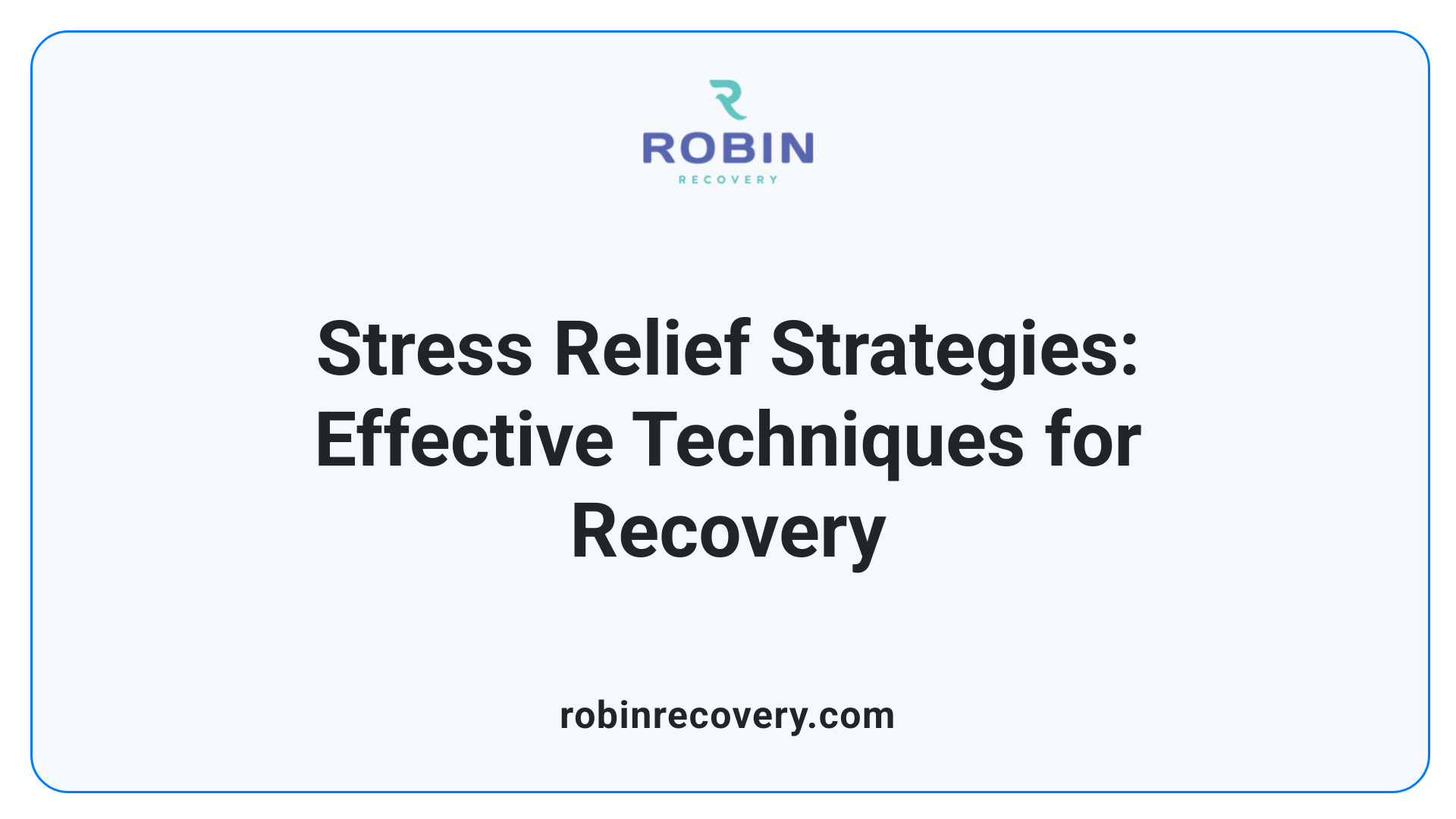
What are effective techniques for managing stress during recovery from addiction?
Effective techniques for managing stress during recovery from addiction include engaging in enjoyable activities and self-care practices. Simple actions like taking leisurely baths, reading, or spending time with pets can significantly contribute to stress reduction.
Practices to lower stress levels
Establishing a healthy routine with regular exercise is one of the most impactful strategies. Physical activity can help lower stress levels and improve mood by releasing endorphins, the body's natural stress relievers. Aiming for at least 20 minutes of exercise, like yoga or running, helps combat anxiety. Similarly, maintaining a balanced diet is essential; consuming nutrient-rich foods stabilizes mood and energy levels, while adequate hydration supports overall well-being.
Role of nutrition and self-care
Self-care goes beyond nutrition; it encompasses various lifestyle choices that nurture one's mental health. Engaging in relaxation techniques, such as deep breathing exercises and mindfulness meditation, promotes a sense of peace and aids in emotional regulation. Taking nature walks or simply enjoying outdoor activities can also foster a healing environment while reducing anxiety.
Benefits of mindfulness practices
Mindfulness practices play a crucial role in managing stress during recovery. Techniques such as meditation and focused breathing bring attention back to the present moment, helping to detach from overwhelming thoughts and emotions. Practicing these techniques can enhance emotional resilience and provide tools to handle stress more effectively.
By incorporating these strategies, individuals can foster a supportive, healthy environment that significantly aids recovery.
Maintaining Sobriety Through Stress Management
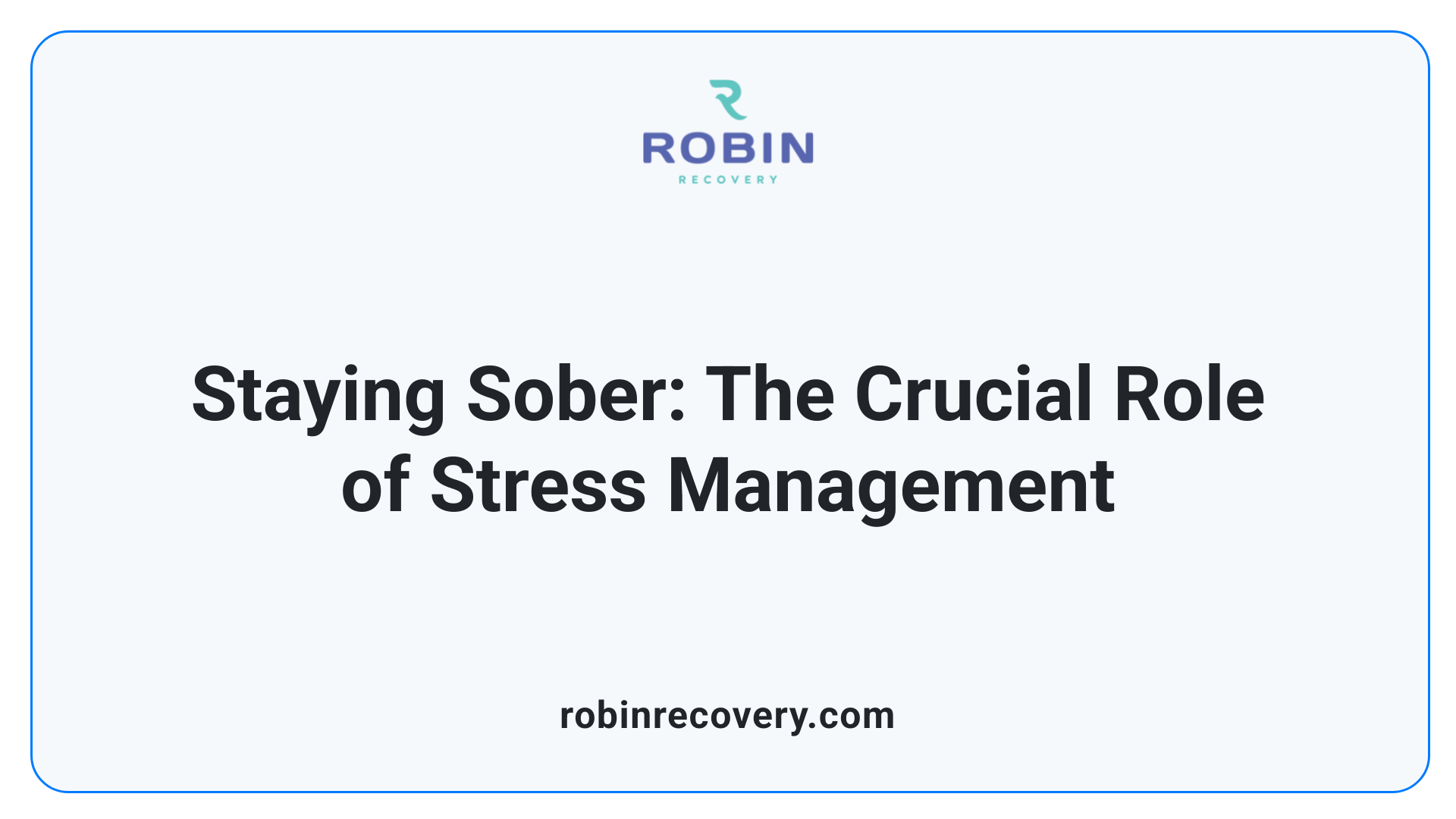
How does stress management contribute to maintaining sobriety?
Stress management plays a crucial role in maintaining sobriety by helping individuals address the various stressors that can trigger cravings and lead to relapse. Effective techniques such as regular exercise, healthy eating, and adequate sleep can enhance mental and physical well-being, reducing emotional vulnerabilities.
Engaging in regular physical activity, such as yoga or running, releases endorphins that boost mood and reduce feelings of anxiety. This aspect of stress management provides a healthy distraction from cravings associated with emotional distress.
Additionally, mindfulness practices like meditation and deep breathing foster clarity and calmness, enabling individuals to manage stress without resorting to substances. Deep breathing techniques, for instance, activate the body’s relaxation response, providing immediate relief in stressful moments.
The role of exercise and mindfulness
Both exercise and mindfulness significantly contribute to stress reduction. Exercise not only alleviates frustration but also helps avoid unhealthy coping mechanisms. Regular physical activity, such as brisk walking or engaging in group sports, supports recovery by creating a routine that counters the chaos of early sobriety.
Mindfulness techniques, including journaling and meditation, allow individuals to explore their thoughts and emotions. By practicing gratitude and focusing on the present, they can lessen negative thought patterns and enhance emotional resilience.
The importance of support networks
Developing a strong support network is another pillar of effective stress management during recovery. Engaging with support groups like Alcoholics Anonymous provides social interaction and understanding, which are vital for emotional relief.
Talking about feelings with trusted friends or family helps alleviate bottled-up emotions, reducing overall stress levels. This supportive dialogue can encourage accountability and reinforce sobriety.
In summary, proactive stress management strategies, integrating exercise, mindfulness, and building supportive relationships, are essential for sustaining recovery and preventing the harmful impact of stress on sobriety.
Practical Coping Strategies for Stress in Recovery
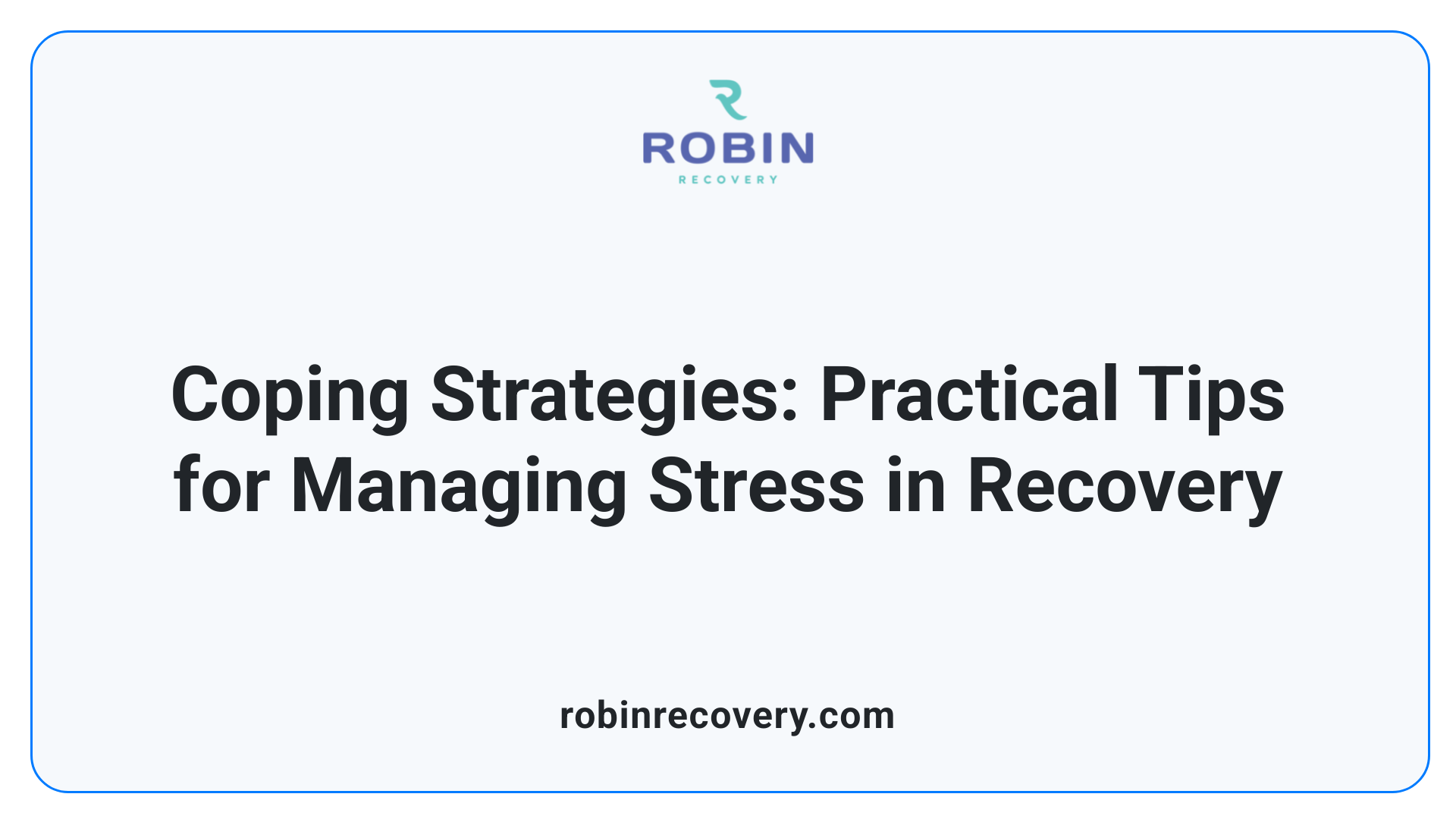
What are practical coping strategies for stress management in the context of recovery?
Managing stress is crucial for those on the recovery path, as it significantly impacts emotional resilience and the risk of relapse. Here are some effective strategies:
1. Exercise and Mindfulness
Regular physical activity, such as running, yoga, or even walking, is essential for reducing stress by releasing endorphins. These natural mood lifters enhance overall well-being and can serve as healthy distractions from cravings. Mindfulness practices, including meditation and deep breathing exercises, help individuals stay grounded and present, which can mitigate anxiety during challenging times.
2. Balanced Diet and Sleep
A nutritious diet plays a pivotal role in supporting mental health. Consuming balanced meals rich in fruits, vegetables, and omega-3 fatty acids can stabilize energy levels and reduce stress. Equally important is quality sleep; establishing a consistent sleep routine can alleviate fatigue and improve emotional clarity, preventing stress from becoming overwhelming.
3. Support Systems
Building a strong support network is vital in recovery. Engaging with support groups, friends, and family not only provides emotional support but also alleviates feelings of isolation. Honest communication about stressors and feelings can foster understanding and connection, reinforcing motivation to maintain sobriety.
Incorporating these coping strategies into daily routines can significantly enhance stress management, contributing to a successful recovery journey.
Identifying Stressors and Building a Support System
How can one identify stressors and develop a support system during recovery?
Identifying personal stress triggers is a vital step in maintaining recovery. Individuals can begin by practicing mindfulness and self-reflection to recognize patterns that lead to stress. Journaling can serve as a therapeutic outlet, allowing one to process emotions and clarify thoughts about specific stressors, such as financial worries or relationship conflicts.
Building a support network is equally important. Surrounding oneself with family, friends, and support group members can provide emotional relief and a sense of belonging, crucial during recovery. Engaging in conversations about feelings can alleviate the burden of bottled emotions, fostering a supportive environment where discussions about stressors are normalized.
Participation in mutual aid organizations, such as Alcoholics Anonymous or Narcotics Anonymous, offers peer support and creates a community that understands the unique challenges of recovery. These networks not only provide encouragement but also share coping strategies to manage stress, significantly reducing the risk of relapse.
Additional Stress Management Strategies
Strategy Description Benefits Mindfulness Practices Techniques like meditation and focused breathing to enhance awareness of stress triggers. Increases emotional regulation and calmness. Regular Exercise Engaging in physical activities to release endorphins and reduce anxiety. Improves mood and facilitates relaxation. Consistent Sleep Routine Establishing a healthy sleep schedule to enhance recovery and reduce stress. Lowers stress hormone levels. Engage in Self-Care Activities that bring joy, such as hobbies and spending time in nature. Reduces emotional strain and promotes joy.
Incorporating these strategies can further stabilize the recovery process and mitigate stress effectively.
Exploring the Stress-Recovery Relationship
What is the relationship between stress and recovery, including its impact on health?
The relationship between stress and recovery is complex, as stress can negatively impact both physical and mental health. Chronic stress triggers heightened physiological responses, such as elevated cortisol levels, which can impede recovery processes and lead to long-term health complications.
For instance, stress is associated with delayed wound healing and poorer surgical outcomes, highlighting its detrimental effects on recovery. Increased inflammation caused by stress can hinder healing processes, especially for conditions like arthritis.
Furthermore, persistent stress can lead to emotional vulnerability and impulsive behaviors, elevating the risk of relapse in individuals recovering from substance use issues. Stress tends to amplify cravings, making the recovery process particularly challenging.
Effective stress management strategies are essential for promoting recovery and mental well-being. These strategies include:
- Adequate Sleep: Prioritizing sleep helps regulate stress hormones and enhances emotional resilience, critical during recovery.
- Physical Activity: Regular exercise releases endorphins, natural stress relievers that improve mood and diminish anxiety, significantly supporting the recovery process.
- Relaxation Techniques: Practices such as meditation, deep breathing, and mindfulness can help individuals cultivate a sense of calm and clarity, aiding in stress reduction.
By employing these strategies, individuals can mitigate the negative effects of stress, fostering a healthier path toward recovery.
Additional Stress Management Tips for Recovery
Creating routines for stability
Establishing a structured daily routine is essential during recovery. It mitigates uncertainty and chaos in life, providing a clear path to follow. A routine can encompass daily goals for work, self-care, physical activities, and leisure, allowing individuals to prioritize their mental and physical health.
Adopting positive mindsets
Fostering gratitude and maintaining a positive outlook can effectively counteract stress. Simple practices, like journaling five things you’re thankful for daily, can shift your focus away from negative thoughts. Engaging in hobbies or creative expressions helps individuals cultivate joy, while mindfulness practices like meditation let them remain centered, reducing anxiety regarding challenges.
Utilizing professional support
Recognizing when stress becomes overwhelming is crucial. Enlisting help from therapists or counselors can provide tailored strategies to cope with stressors effectively. Support groups also play an essential role, offering emotional relief and a sense of belonging, which is invaluable for those navigating recovery.
Conclusion
Managing stress effectively is fundamental for individuals recovering from addiction. By using a combination of mindfulness, exercise, support networks, and healthy lifestyles, individuals can create a supportive environment conducive to recovery. Understanding how stress impacts recovery allows for the development of proactive strategies to prevent relapse and enhance overall well-being. The journey to sobriety is arduous, but with the right strategies, individuals can build emotional resilience and sustain long-term recovery.
References
- Effective Stress Management Techniques for Recovery
- How to Manage Stress in Addiction Recovery: 9 Essential Tips
- 23 Tips For Building Resilience And Managing Stress
- Stress Management in Recovery – Strategies for Maintaining Balance
- Recovering from Chronic Stress: Actionable Strategies - Healthline
- The Importance of Stress Management for Health and Recovery
- 10 Healthy Ways to Cope with Stress in Addiction Recovery | RDT
